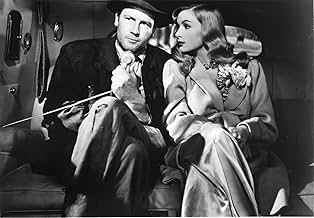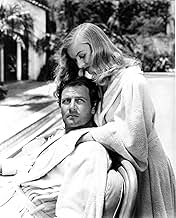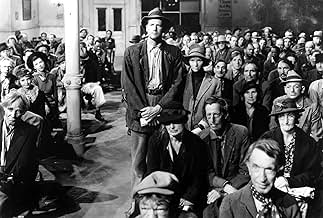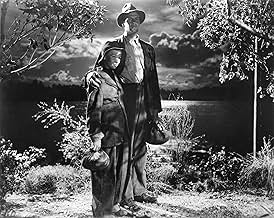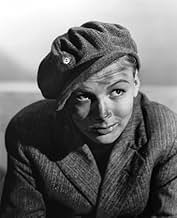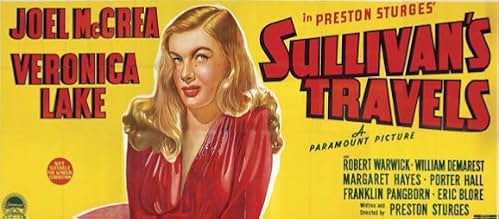IMDb-BEWERTUNG
7,9/10
29.314
IHRE BEWERTUNG
Ein Hollywood-Regisseur, John L. Sullivan, macht sich auf den Weg, das Leben als armer, obdachloser Mensch zu erleben, um relevante Lebenserfahrung für seinen nächsten Film zu sammeln.Ein Hollywood-Regisseur, John L. Sullivan, macht sich auf den Weg, das Leben als armer, obdachloser Mensch zu erleben, um relevante Lebenserfahrung für seinen nächsten Film zu sammeln.Ein Hollywood-Regisseur, John L. Sullivan, macht sich auf den Weg, das Leben als armer, obdachloser Mensch zu erleben, um relevante Lebenserfahrung für seinen nächsten Film zu sammeln.
- Auszeichnungen
- 2 wins total
Charles R. Moore
- Colored Chef
- (as Charles Moore)
Handlung
WUSSTEST DU SCHON:
- WissenswertesCinematographer John Seitz admired Preston Sturges' unconventional approach to his work. The opening scene comprised ten pages of dialogue to cover about four and a half minutes of screen time. It was scheduled for two complete days of shooting. On the morning of the first day, Seitz found Sturges inspecting the set with a viewfinder, looking for where he could cut the scene and change camera set-ups. Seitz dared him to do it all in one take. Never one to refuse a dare, Sturges took him up on it, although the nervous Seitz had never attempted to complete a two-day work schedule in one day. With the endorsement of McCrea and the rest of the actors, Sturges pressed on, determined to set a record. The first take was fine, but the camera wobbled a little in the tracking shot following the men from screening room to office, so they tried again. They did two or three takes at the most and that was it - two full days work by 11 a.m. on the first day, a feat that had the entire studio buzzing.
- PatzerWhen Sullivan and the Girl jump off the train and walk to the lunch stand, nothing is visible around the outside of the lunch stand--not a car, tree or anything. When Sullivan asks if the proprietor had seen a land yacht (a big RV), the proprietor points to the side and they look out the window and see the big land yacht parked there. Of course, if it had been there in the first place, Sullivan would have seen it right away and not gone into the lunch stand.
- Zitate
[last lines]
John L. Sullivan: There's a lot to be said for making people laugh. Did you know that that's all some people have? It isn't much, but it's better than nothing in this cockeyed caravan.
- Crazy CreditsThe Paramount logo appears as a seal on a package.
The package is opened to reveal a book with the film title on it and the opening credits appear on pages in the book.
- VerbindungenFeatured in The Cinematographer (1951)
- SoundtracksSpring Song
(1844) (uncredited)
Written by Felix Mendelssohn
Played as part of the score when Sullivan starts his experiment
Reprised when he starts a second time
Ausgewählte Rezension
After the opening credits, the film opens with the following statement.
"To the memory of those who made us laugh: the motley mountebanks, the clowns, the buffoons, in all times and in all nations whose efforts have lightened our burden a little, this picture is affectionately dedicated."
With this film, Preston Sturges made one of the smartest and most insightful comedies ever to come out of Hollywood, in which he especially held up the mirror to Tinseltown itself. A Hollywood variation on Gulliver's Travels, it's the tale of Hollywood director John Sullivan (Joel McCrea), tired of making Hollywood Fluff, who wants to branch out with a socially conscious epic, called "O Brother, Where Art Thou", and sets out to research the meaning of poverty. His studio bosses (very funny roles by Robert Warwick and Porter Hall) try to tell him it's a ridiculous idea but Sullivan insists, puts on some hobo clothes and sets out to see what it's like to experience poverty and suffering. The studio soon sees it as potential publicity stunt and sent an entire crew to follow him around during his trip.
Some very enjoyable references to socially conscious movie-making, to Ernst Lubitch in particular, make this particularly fun with some knowledge of the period and the films mentioned, albeit not necessary. And almost worth seeing alone for Veronica Lake's memorable performance as a failed starlet.
According to Sturges, the film did contain a little "message":
"SULLIVAN'S TRAVELS is the result of an urge, an urge to tell some of my fellow filmwrights that they were getting a little too deep-dish and to leave the preaching to the preachers."
By any means, he made a uniquely self-reflective comedy about Hollywood with wonderful characterizations and superlative performances. A brilliant satire with a "message" just as poignant as ever.
Camera Obscura --- 9/10
"To the memory of those who made us laugh: the motley mountebanks, the clowns, the buffoons, in all times and in all nations whose efforts have lightened our burden a little, this picture is affectionately dedicated."
With this film, Preston Sturges made one of the smartest and most insightful comedies ever to come out of Hollywood, in which he especially held up the mirror to Tinseltown itself. A Hollywood variation on Gulliver's Travels, it's the tale of Hollywood director John Sullivan (Joel McCrea), tired of making Hollywood Fluff, who wants to branch out with a socially conscious epic, called "O Brother, Where Art Thou", and sets out to research the meaning of poverty. His studio bosses (very funny roles by Robert Warwick and Porter Hall) try to tell him it's a ridiculous idea but Sullivan insists, puts on some hobo clothes and sets out to see what it's like to experience poverty and suffering. The studio soon sees it as potential publicity stunt and sent an entire crew to follow him around during his trip.
Some very enjoyable references to socially conscious movie-making, to Ernst Lubitch in particular, make this particularly fun with some knowledge of the period and the films mentioned, albeit not necessary. And almost worth seeing alone for Veronica Lake's memorable performance as a failed starlet.
According to Sturges, the film did contain a little "message":
"SULLIVAN'S TRAVELS is the result of an urge, an urge to tell some of my fellow filmwrights that they were getting a little too deep-dish and to leave the preaching to the preachers."
By any means, he made a uniquely self-reflective comedy about Hollywood with wonderful characterizations and superlative performances. A brilliant satire with a "message" just as poignant as ever.
Camera Obscura --- 9/10
- Camera-Obscura
- 14. Sept. 2006
- Permalink
Top-Auswahl
Melde dich zum Bewerten an und greife auf die Watchlist für personalisierte Empfehlungen zu.
Details
Box Office
- Budget
- 689.665 $ (geschätzt)
- Weltweiter Bruttoertrag
- 10.249 $
- Laufzeit1 Stunde 30 Minuten
- Farbe
- Seitenverhältnis
- 1.37 : 1
Zu dieser Seite beitragen
Bearbeitung vorschlagen oder fehlenden Inhalt hinzufügen

Oberste Lücke
By what name was Sullivans Reisen (1941) officially released in Canada in French?
Antwort

